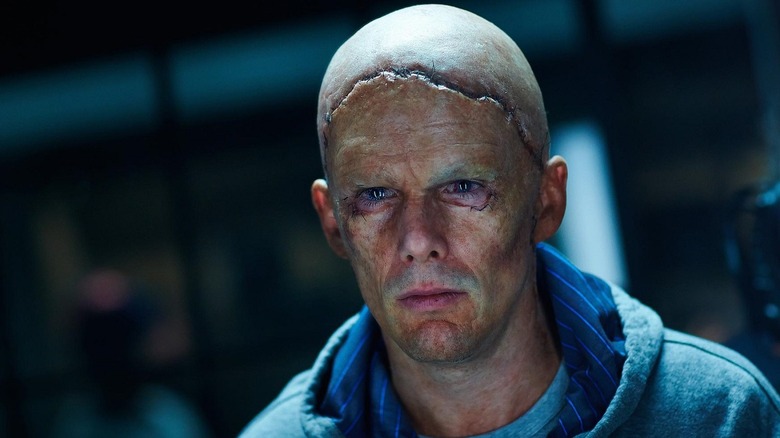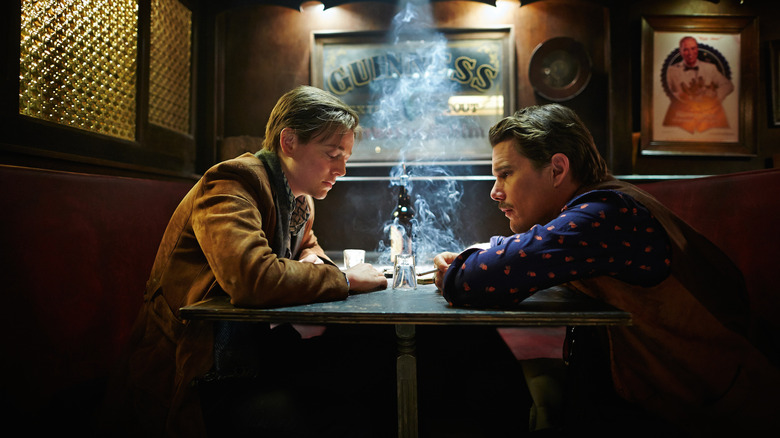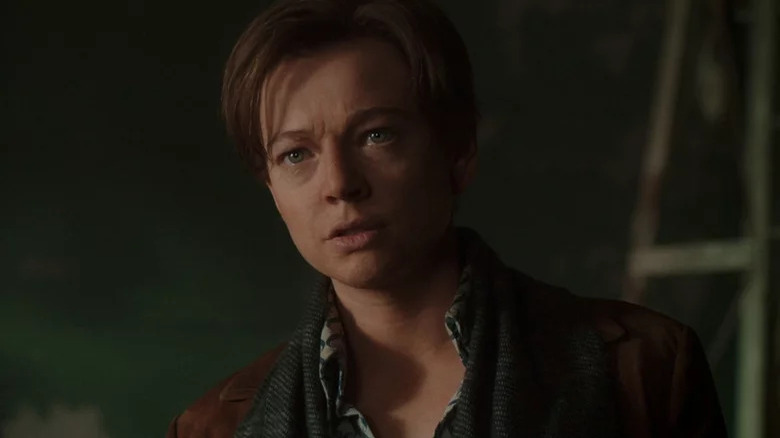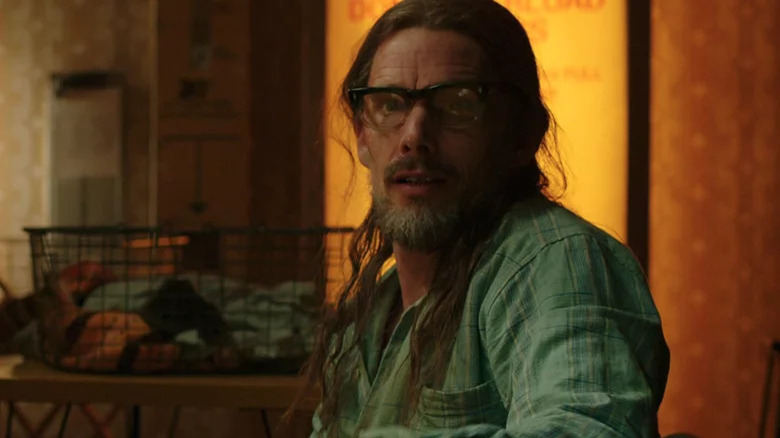Predestination Ending Explained: Wibbly Wobbly, Timey-Wimey Stuff
Ethan Hawke may be best known for his dramatic work, but real ones know his best and coolest work is often found in low-budget genre movies. Whether it's horror, or his collaborations with the Spierig brothers on two fantastic genre movies that are all the right amounts of weird. First there was "Daybreakers," an ambitious film about a world overrun by vampires. Then there was "Predestination," a movie best described as "a big ball of wibbly-wobbly, timey-wimey ... stuff."
"Predestination" is a spectacularly brainy movie, the kind that — like Shane Carruth's "Primer" — inspired more than a few diagrams to try and explain all the time travel shenanigans. Based on the 1959 short story " '—All You Zombies—' " by Robert A. Heinlein, it starts out as a simple thriller about a time-traveling cop chasing a bomber, but becomes so much more.
Despite its low budget, this is the kind of movie that creates such a vivid world for itself, such a fleshed-out collection of characters (well, character, but more on that later), that even beyond the many twists and turns it sticks in your mind. But still, those twists and turns are definitely a big part of why this movie has gained a cult following in the years since its lackluster release. Let's untwine this time web, shall we?
What you need to remember about the plot of Predestination
The movie begins with the character Agent Doe chasing a bomber in the '70s. After failing to capture him, Doe's face is disfigured in the blast, and after reconstructive surgery he turns into Ethan Hawke. Doe, who had retreated to the safety of 1992 using a time travel device, travels back again to the early '70s where he meets a writer named John, who tells Doe his life story.
Turns out, John was born female, growing up as Jane (Sarah Snook) in an orphanage under a lot of abuse. After failing to be recruited into a space program, in 1963 she fell in love with a man, who left her pregnant and then disappeared. When Jane gives birth, the doctors discover she is intersex, and force her to undergo gender reassignment surgery without her consent. While this is happening, Jane's baby is abducted.
Jane blames her lover for ruining her life, and after the surgery changes her name to John. Agent Doe, upon hearing the story, offers John the chance to take revenge by becoming Doe's replacement. He tells John he is a time traveler and believes the bomber is the same man who left Jane pregnant and alone. The two travel back to the '60s, where John meets Jane and realizes he is the man Jane fell in love with. Despite knowing their relationship is doomed, John can't help but once again fall in love with themselves, getting Jane pregnant before Doe convinces him to leave Jane and go back to his time.
While this is happening, Doe also travels back in time to 1964, and steals Jane's baby, taking them back in time to 1945 and leaving them in an orphanage. That's right, that baby was Jane, who is not only John, but also their own mother and father — how about that Christmas family dinner!
What happened at the end of Predestination?
While Agent Doe still thinks about recruiting John to be his replacement, his boss — who is the same man who tried to recruit Jane for a special government program in the 1960s — reveals that Doe is also the future version of John/Jane after his face was put back together. This is why Doe is the perfect time-traveling agent, he is a person with no past and no future, just one giant time pretzel, a Jeremy Bearimy. Jane, who is John, has a baby who is also Jane/John, and after John leaves Jane he becomes Agent Doe, who fails to stop the bomber, and then meets John to send him back in time and impregnate herself to kickstart the cycle.
And turns out, all the time travel makes Doe a bit crazy, and at some point he also turns into the bomber from the start of the film too! The bomber, Doe's future self, claims that their boss set this whole thing up, and if Doe kills the bomber, he eventually becomes him. Doe, of course, ignores the giant red flag and shoots his nemesis, before seeing that the bomber indeed has his same facial scars. Though Doe vows not to become the bomber, a tape recorder left by Doe to John can be heard at the end of the film, where Doe ponders whether the future can truly be changed.
What the end of Predestination means
When it comes down to it, all time travel movies are about whether the past defines us. "Predestination" is no different, but the way it goes about it, and the specific way it talks about trauma and letting go, all within the brainy and complex timeline of events, are what makes it special.
At every point, Doe/John/Jane/Bomber decides to continue the cycle even knowing where it is heading, because John fell in love, because Doe was stubborn, because the bomber was assured. Unlike, say, "Back to the Future," this movie kind of argues that the past can never be changed; it is immutable. What can change is how you go about facing the future. John was always going to fall in love with Jane, and maybe Doe was always going to kill the bomber, but he did not have to go through with the bombings that kickstarted the mission.
What has the cast and crew said about the ending?
Speaking with IndieWire, Ethan Hawke described the film as being about a sort of gender war inside every person. "Every person is masculine and feminine and they're at war with each other. And it moves. The whole end of the movie is about him loving himself. And if he doesn't, then the cycle will actually continue. It's an obvious masculine/feminine yin/yang thing."
Meanwhile, the Spierig brothers talked to Collider about what they wanted people to get from the film at large. "Are the events in the film always going to occur that way?" Peter Spierig said. "Are they meant to occur that way? That's up to the audience to decide. But having said that, I personally think, even if we had choice, how could you ever know?"
"It's definitely a tragedy," he continued. "We always thought of it as a really tragic love story. That was our intention from the beginning. But you also have to look at the person's life in this film as a person who has accomplished great things at a great cost."




